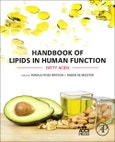Handbook of Lipids in Human Function: Fatty Acids presents current research relating to health issues whose impact may be modified by adopting personalized diets and lifestyle interventions of the consumption of fatty acids. Addressing cardiovascular and neurological diseases as well as cancer, obesity, inflammatory conditions, and lung disease, the authors correlate lipid sources with specific conditions, providing important insights into preventative as well as response-based actions designed to positively impact health outcomes.
The material is presented in 29 chapters and brings together the research and work of an international team of experts. designed to bridge the gap between traditional approaches to dietary interventions and leading edge integrated health strategies, Handbook of Lipids in Human Function: Fatty Acids is a valuable resource for researchers and clinicians.
- Discusses the importance of essential fatty acids in maintaining cardio- and cerebro-vascular health
- Explains the metabolic risks associated with deficiencies and/or imbalance of essential fatty acids
- Explores the promise of essential fatty acids as adjuvants to pharmacopoeia
- Suggests interventions with personalized lipid diets
Please Note: This is an On Demand product, delivery may take up to 11 working days after payment has been received.
Table of Contents
Chapter 1: Personalized Diet and Lifestyle Interventions on Lipids and LipoproteinsChapter 2: Trans Fats and Risks of Cardiovascular Diseases: Facts or Artifacts?
Chapter 3: Fatty Acids and Cardiac Ischemia Reperfusion Injury
Chapter 4: Lipids Nutrition and Epigenetic Modification in Obesity-Related Co-Morbitities
Chapter 5: Dairy Products: Their Role in the Diet and Effects on Cardiovascular Disease
Chapter 6: Fatty Acids in Corn Oil: Role in Heart Disease Prevention
Chapter 7: Dietary Approaches to Reduce Aortic Stiffness
Chapter 8: Inflammation and Atherogenic Effects Due to Saturated Fatty Acids
Chapter 9: The Use of Omega-3 Polyunsaturated Fatty Acids (n-3 PUFAs) in Atrial Fibrillation
Chapter 10: Individual Fatty Acids in Cardiometabolic Disease
Chapter 11: Omega-3 Polyunsaturated Fatty Acids in Patients with Coronary Disease Treated with Percutaneous Coronary Intervention
Chapter 12: Effects of Omega-3 Fatty Acid Supplementation on Cognition in Children
Chapter 13: The Effects of Glycerophospholipids and Fatty Acids on APP Processing: Implications for Alzheimer's Disease
Chapter 14: Role of Dietary Fatty Acids in Mood Disorders
Chapter 15: Biochemical Aspects of n-6 and n-3 Fatty Acid-Derived Lipid Mediators in the Brain
Chapter 16: Neurocognitive Functions and Lipids
Chapter 17: What Are the Physiological Roles of Mead Acid (5,8,11-Eicosatrienoic Acid)?
Chapter 18: Fat Metabolism During Exercise and Dietary Interventions for Enhancing Fat Metabolism and Athletic Performance
Chapter 19: Ruminal Metabolism of Fatty Acids: Modulation of Polyunsaturated, Conjugated, and Trans Fatty Acids in Meat and Milk
Chapter 20: Lipids and Metabolic Syndrome
Chapter 21: Fatty Acids and Hypothalamic Dysfunction in Obesity
Chapter 22: Dietary Lipid Determines the Health of Airway Epithelia and the Lungs
Chapter 23: Oleic Acid and Lung Injury
Chapter 24: Dietary Fats and Inflammation
Chapter 25: Intensive Lipid-Lowering Treatment in Patients with Inflammatory Joint Diseases
Chapter 26: Arachidonic Acid and Cancer Risk
Chapter 27: Blood Cell Membrane Omega-3 (n-3) Fatty Acid Abnormality and Supplementation in Patients with Sickle Cell Anemia
Chapter 28: Lipids, Low-Grade Chronic Inflammation and NAFLD: A Menage A Trois?
Chapter 29: Disturbances of Lipid Metabolism in a Cancer Cell and How This Knowledge Increases Its Role in Clinical Oncology








